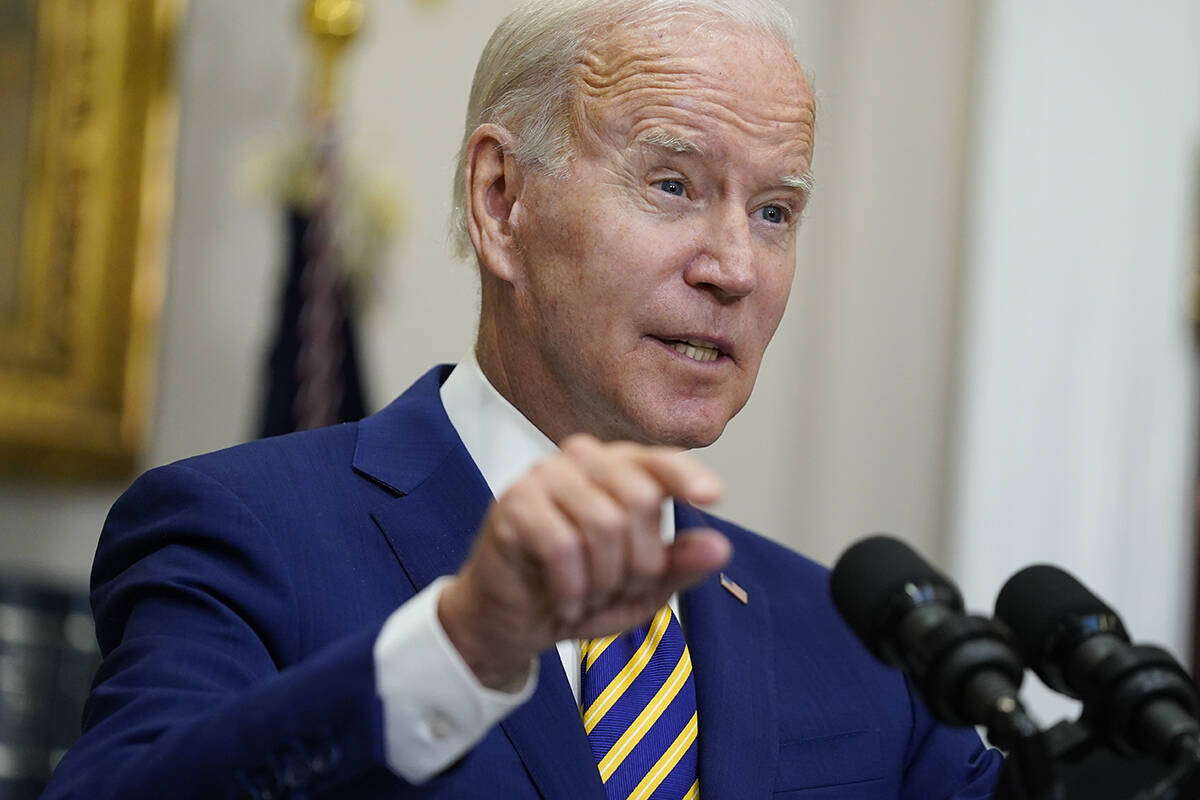What does Biden’s student loan relief plan mean for Nevada?
Michael Henderson, a 36-year-old Las Vegas resident who owns two businesses, did not go to college because of the expense, he said. So when he heard President Joe Biden is forgiving up to $10,000 of federal student loans for people making less than $125,000 this week, he thought it was a good first step.
“It’s a good announcement but at the same time there’s massive amounts of work to be done because if you’re going to be in the greatest country, you’d want everybody to be super educated and give it to them for free,” Henderson said.
After Biden announced his plans this week, which include forgiving up to $20,000 for students who received Pell Grants, a flurry of mixed responses erupted across the country, with many recent college graduates celebrating and economists worrying about the national debt.
Will it actually help?
It’s not totally clear how much the student debt relief plan will cost, since it depends on how many people apply and qualify. There are also benefits that are more difficult to measure, experts say.
Economists also have mixed opinions about what impact the plan will have on the economy. Organizations such as the National Taxpayers Union Foundation and the Federal Reserve Bank of New York estimated it could cost between $300 billion to $600 billion.
The plan would forgive a total of $321 billion of federal student loans and eliminate the entire balance for 11.8 million people, according to the Federal Reserve Bank of New York.
The Committee for a Responsible Federal Budget estimates it will cost between $440 billion and $600 billion over the next 10 years, and the Penn Wharton University of Pennsylvania Budget Model reported it would cost about $2,000 per taxpayer.
And with the income-driven repayment plan that was also introduced, which will lower the amount owed per month for borrowers, the Committee for a Responsible Federal Budget estimates that it will cost an additional $90 billion to $190 billion.
“The changes announced (this week) will likely cost more than double the amount saved through the recently passed Inflation Reduction Act, completely eliminating any disinflationary benefit from the bill,” the Committee for a Responsible Federal Budget wrote. “The proposed loan changes also do nothing to reduce the amount of borrowing moving forward, setting up a future administration to be called on to cancel debt again.”
Increasing inflation?
While the cancellation will put more money in people’s pockets and increase spending, the Committee for a Responsible Federal Budget wrote in February that canceling student debt would boost personal consumption and would increase inflation.
But Joseph E. Stiglitz, a professor at Columbia University and the chief economist at the Roosevelt Institute, wrote in an Atlantic piece that the plan’s long-term benefits will help the economy. Criticisms that the plan will increase inflation presume that people will go on a “spending spree,” he said, but in reality the money will be spent “gradually over the course of a person’s life, not all in one year.”
There’s also benefits that are not as easily measured, said Federick Ngo, an assistant professor of higher education at UNLV who focuses on the impact of higher education policies and practices.
“Higher education is, in many ways, what’s called a public good,” Ngo said. “It’s just good for society to have more education.”
More education contributes to advancement of technology and to better-informed citizens, Ngo said. The Economic Policy Institute, for example, reported in 2013 on the advantages of a well-educated society, finding a “clear and strong correlation” between education of a state’s workforce and higher wages in the state.
“Those are all benefits that are really hard to measure for the community and society, but they’re there,” Ngo said. “It’s not just the benefits to the individual. There’s ways it will benefit you as a taxpayer.”
Forgiving some amount of student loan debt also will allow graduates to enter the next phases of their lives, such as getting married, starting a family and buying a house, Ngo said.
There are many people who dropped out of college due to finances, he added, so the debt forgiveness plan could help motivate them to go back.
“Just students knowing that it will cost less than anticipated, it’s a pretty big lever in terms of inspiring students to enroll and complete college,” Ngo said. With one of the lowest education rates in the country, Nevada could also see improvements in its education ratings, Ngo said.
Nevada has lower debt numbers relative to students in other states, Ngo said, in part because higher education is relatively more affordable. According to the U.S. News and World Report, UNLV graduates have among the lowest debt at less than $20,000 on average.
“But it’s still an issue for students here,” Ngo said. “I think this will really change peoples lives and their economic outlook on life. Hopefully they’ll be able to participate in ways that they haven’t before.”
Disagreeing with Biden
Sen. Catherine Cortez Masto, D-Nev., did not agree with Biden’s executive action because it does not address the root problems that make college unaffordable in the first place, she said.
“We should be focusing on passing my legislation to expand Pell Grants for lower income students, target loan forgiveness to those in need, and actually make college more affordable for working families,” Cortez Masto said in a statement, referring to the Student Debt Relief and College Affordability Act she introduced in June that would increase the amount of Pell Grants students can receive and centers loan forgiveness on the low and moderate-income Americans.
Despite Cortez Masto’s opposition to the plan, her opponent in her race for re-election, former Attorney General Adam Laxalt, linked her to the debt relief, which he called “unconstitutional,” “immoral” and a “fundamentally bad policy” on Twitter.
The Biden/@CortezMasto $300B student debt bailout is unconstitutional, immoral, & fundamentally bad policy.
It will line the pockets of the wealthiest Americans & fuel the flames of inflation, layering further pain on the back of Nevada families already struggling to get by.
1/6— Adam Paul Laxalt (@AdamLaxalt) August 24, 2022
He argued it will help wealthy Americans and will “fuel the flames of inflation,” citing the Penn Wharton University of Pennsylvania Budget Model, which estimated that forgiving federal college student loan debt will cost between $200 billion and $980 billion over a 10-year window.
Rep. Dina Titus, D-Nev., said in a statement that as a UNLV professor, she has witnessed promising students drop out of school because of financial hardships.
“Making higher education more affordable is not only an investment in generations to come,” Titus said in the statement. “It is also an investment in our economic viability, workforce, and leadership on the global stage.”
Political move?
Rep. Mark Amodei, R-Nev., said in a statement that the Biden administration was just seeking “a few votes.”
What will the effects of Biden’s announcement be on the upcoming midterms, and even the 2024 Presidential election? Dan Lee, a UNLV associate professor of political science, said he thinks it will have a “pretty marginal net effect” as far as improving the prospect for Democrats this fall.
With almost a third of the voter base in Nevada nonpartisan, Republicans can appeal to them with arguments that the move could increase inflation, Lee said.
“Republicans have that narrative they can tell to mobilize their supporters,” Lee said. “There’s that benefit, but there’s also a political cost to it.”
For Biden, the plan can help mobilize Democrats and the younger voters to re-elect him, Lee said. Biden had promised debt relief while campaigning in 2020.
Said Lee: “It’s something he can claim credit for, accomplishing something … getting these victories is hard to do in this day and age.”
Biden’s approval rankings have recently bounced back, Lee said, in part due to inflation leveling off and gas prices lowering. He also helped pass the Inflation Reduction Act, Lee said, which is a legislative victory for him.
His student debt relief plan, as well as other issues that Democrats have used to mobilize their voters, such as abortion, could also help him, Lee said. But Lee added that Biden’s election in 2020 was more about people voting against then-President Donald Trump.
Students’ mixed reactions
Current students also have mixed reactions to the news, with some wanting more, while others are unsure if forgiving debt is the answer.
Destini Olsen, 20, is a second-year nursing student at UNLV. She did not take out any loans for college but received scholarships. She said it’s interesting that Biden is trying, but she does not think forgiving student loans is the answer. “It’s not one of those things where you’re really making a difference,” Olsen said. She would rather see more opportunities for students to earn more money and have more grants and scholarships.
“Students want to have that pride and, ‘I did it,’” Olsen said. “Not just being handed over and just saying, ‘it’s fine.’”
Rickey Pradhan, a third-year student studying computer science at UNLV, is a Pell Grant recipient and was happy to hear about the news.
“I think it’s good for the people actually struggling with not having the Pell Grant opportunities and stuff like that,” Pradhan said. “I know there’s people who, you know, they can’t qualify. They can’t apply for (Free Application for Federal Student Aid) and stuff like that. I think it’s a good thing.”
Change in Nevada?
Biden’s decision has led Nevada officeholders to also seek changes to Nevada’s student loan repayment program.
Democratic state Treasurer Zach Conine, following Biden’s action, filed legislation this week for the 2023 Legislature to create a student loan repayment program for women’s health care professionals. Conine said in a statement that Nevada is facing challenges in attracting qualified health care professionals in rural and low-income urban areas.
Conine proposes that all new providers of health care who graduate from a Nevada System of Higher Education institution would be eligible for up to $120,000 in student loan repayment in exchange for five years of service in an underserved area in Nevada. The legislation would also provide student loan repayment to obstetricians, gynecologists and other providers of women’s health care services.
Funding for the program would come from the Abandoned Property Trust Account. Nevada is holding more than $940 million in unclaimed property, according to the state treasurer’s website.
“I look forward to working with the members of the Legislature on this proposal to keep our best and brightest students here in Nevada,” Conine said in the statement, “while increasing access to vital healthcare services for all of our residents.”
Contact Jessica Hill at jehill@reviewjournal.com. Follow @jess_hillyeah on Twitter.


















